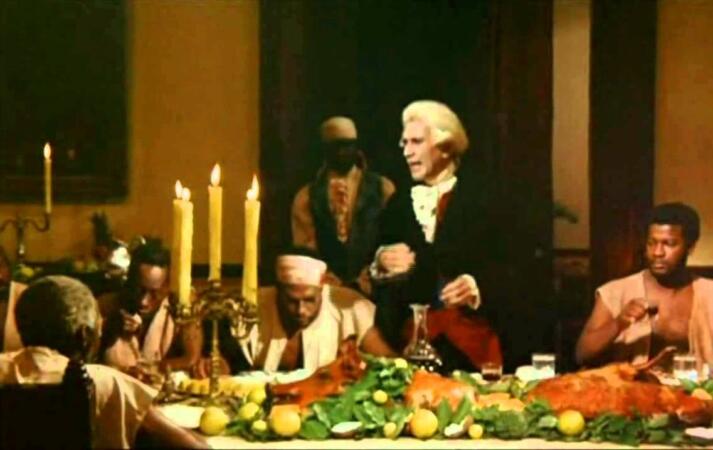
The 1976 Cuban film “The Last Supper” (“La Ultima Cena”), directed by Tomas Gutierrez Alea from a screenplay penned by Alea and Maria Eugenia Haya, is based on a real life incident, which occurred in Cuba during the 1780’s.
Alea, whose directorial efforts include the acclaimed films “Memories of Underdevelopment” (1968) and “Death of a Bureaucrat” (1966), was inspired by a footnote in Manuel Moreno Fraginals’ post-revolutionary historiography “The Sugarmill,” in which a plantation owner – on a Maundy Thursday (before Good Friday) – washed the feet of 12 slaves and dined with them at his table.
Attempting to fulfill a religious obligation, the Count of a sugar mill in Cuba at the end of the eighteenth century decides to recreate the Last Supper, playing Jesus Christ himself and randomly selecting twelve slaves as his disciples. Tensions break out between Don Manuel, a cruel, hardened overseer who believes that slaves have nothing to do with God and that letting slaves eat at the master’s table is a ridiculous and dangerous practice, and the priest of the mill who believes Christians have a duty to educate and convert the slaves. Among the twelve slaves picked is Sebastian, a stubborn and determined slave who has had his ear cut off and fed to dogs after his most recent escape attempt. The Count makes sure Sebastian is seated at the table and gives him the role of Judas for his inability to embrace life at the mill as Judas failed to embrace Christ. The master and slaves get drunk, and the master makes several promises during the dinner that he either forgets or refuses to keep, among them the promise that the slaves will not have to work on Good Friday. The slaves are forced to work, however, causing a revolt that will lead to the beheading of all the slaves at the dinner except Sebastian, who may have strange powers no one thought possible.
“The Last Supper” is actually quite fascinating, uncompromising and poignant as it exposes colonial Cuba’s contradictions and religious hypocrisy to condone the brutal treatment of slaves. It’s protagonist, a Count and sugarmill plantation owner, is a religious, guilt-ridden man. As a means to encourage productivity, subservience and perhaps contentment among slaves after their brutal abuse perpetrated by the overseer Don Manuel (in one scene Don Manuel cuts the ear off the runaway in front of a repulsed Count), the Count decides to recreate the biblical ‘Last Supper,’ in which he, self-servingly, although wearing a mask of humility, compares himself to Christ to the slaves’ apostles.
The highlight of the film though is the long, brilliant, amusing and intense ‘supper’ scene in which the Count and the slaves mingle, tell stories and frolic over abundant food and wine. The Count gains their trust by granting freedom to an old slave, and promising them a happy ever after in heaven. However, he also delivers sermons on subservience and true freedom, and talks of Blacks having a “natural aptitude for hard labor”; according to the Count’s so-called “wisdom”, nothing belongs to us, all we truly own is our sorrow, which in turn, is given to God with joy, hence real freedom.
“Why do the Blacks have to put up with beatings and why don’t the overseers get beat too?”, asks one of the slaves at the table; to which the master yells back in a drunken stupor, “Because it is God’s will! God’s punishment; God is merciful, but not to the disobedient.”
An expected slave rebellion and some chilling sequences ensue after the overseer Don Manuel doesn’t grant the slaves the Good Friday day off as promised.
Some may label the film as heavy-handed; its agenda is clear, but it is also oddly compelling in its multi-dimensional, complex characterizations. Neither the slaves nor the Count are entirely good or evil.
You are encouraged to watch the film in its entirety below:
